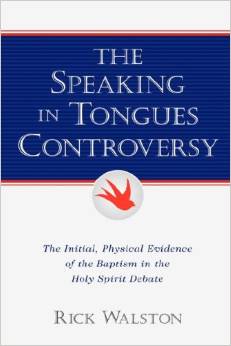The Speaking in Tongues Controversy: A Narrative-Critical Response, Part 1
Differing with Walston, classical Pentecostal Robert Graves writes that the doctrine of initial evidence and the subsequence of the baptism in the Holy Spirit are taught by scripture.

Rick Walston, The Speaking in Tongues Controversy: The Initial, Physical Evidence of the Baptism in the Holy Spirit (Fairfax, VA: Xulon Press, 2003), 235 pages.
The thrust of Rick Walston’s book The Speaking in Tongues Controversy: The Initial, Physical Evidence of the Baptism in the Holy Spirit is that the two major distinctive doctrines of Pentecostal theology—the initial evidence of tongues and the separability/subsequence of Spirit-baptism—are wrong. In his own words, Walston is “attempting to lead the reader to the obvious conclusion that Luke does not intend to establish tongues-as-evidence as a doctrine or as a paradigm” (85); the same can be said for the doctrine of separability and subsequence, though he devotes a scant eight paragraphs to it (141-144).
Walston’s endeavor to disprove these aspects of Pentecostal theology relies on a number of strategies. First, he attempts to show that whereas Pentecostals believe Luke’s theology is predominantly pneumatological, it is in fact more soteriological. For Walston, this entails (1) accepting Acts 2:38-41 as the paradigmatic passage of Acts, (2) statistically comparing the occurrences of pneumatological and soteriological passages in Acts, and (3) redefining the baptism in the Holy Spirit as a salvific event. Second, he constructs an anti-Pentecostal interpretation of Acts using the hermeneutical principle of authorial intent as a singular, over-arching, controlling interpretive canon. This entails building a massive construct upon what Luke does not say at opportune times.
“Then Peter said to them, ‘Repent, and let every one of you be baptized in the name of Jesus Christ for the remission of sins; and you shall receive the gift of the Holy Spirit. For the promise is to you and to your children, and to all who are afar off, as many as the Lord our God will call.’
And with many other words he testified and exhorted them, saying, ‘Be saved from this perverse generation.’
Then those who gladly received his word were baptized; and that day about three thousand souls were added to them.”
— Acts 2:38-41 NKJV


